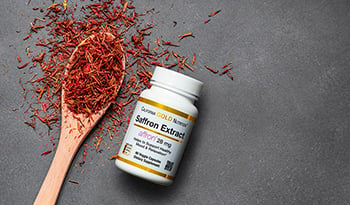3 Helpful Mood Supplements: Lemon Balm, L-Theanine, Magnesium + Their Benefits
FERAGAT:Bu blog tanı koymayı hedeflememektedir...
- Bu makalede:
- Best Mood-boosting Supplements
- Lemon Balm
- L-Theanine
- Magnesium
- Who Should Take a Mood-Calming Supplement?

With anxiety and depression on the rise, many people are seeking natural ways to help them feel more calm, happy, and at ease. While lifestyle factors like exercise, balanced nutrition, and effectively managing stress play important roles in regulating mood, research suggests supplementing with certain micronutrients, like B vitamins, can have beneficial effects on perceived stress, mild psychiatric symptoms, and everyday mood. Likewise, certain herbs, amino acids, and minerals may also help improve mood.
Best Mood-boosting Supplements
This article highlights three of the best calming supplements for boosting your mood—lemon balm, L-theanine, and magnesium—including how they work and how to take them.
Lemon Balm
Lemon Balm, or Melissa officinalis, is a cultivated perennial, lemon-scented herb. Research suggests supplementing with lemon balm may improve mood and cognitive performance, and may help reduce anxiety, treat insomnia, and ease digestive problems; however, its efficacy depends both on the dose and how it is taken. Recent research suggests M. officinal improves mood by interacting with GABA-A receptors in the brain.
A review of studies suggests lemon balm acts as an antioxidant and is effective in combating oxidative stress. As such, lemon balm may also help with conditions related to oxidative stress like type 2 diabetes, chronic neurodegenerative disorders including Parkinson’s and Alzheimer’s disease, and cardiovascular diseases.
Lemon balm is available as a fresh herb, herbal tea, essential oil, or extract. To safely enjoy the benefits of lemon balm, use it with care and follow instructions for dosing.
Taking too much lemon balm may lead to low blood pressure and a fast heart rate, or tachycardia. These symptoms may be due to lemon balm’s GABA-mediated effects. People who are pregnant or breastfeeding should avoid taking lemon balm unless approved by a qualified healthcare provider. Do not combine lemon balm with any other anti-anxiety medications.
L-Theanine
L-theanine, or γ-glutamylethylamide, is a non-protein amino acid found in green, black, white, and oolong tea, as well as in the edible bay bolete mushroom, Xerocomus badius. It is otherwise rare in nature.
L-theanine is available as tablets, capsules, chewables, liquids, and powders and can be consumed in many kinds of tea, specifically green tea. L-theanine is believed to lend flavor to tea leaves. It constitutes between 1% to 2% of the dry weight of tea, corresponding to 25 to 60 milligrams of L-theanine per 200 milliliters serving of tea.
Recent studies suggest that L-theanine may effectively help lower stress, especially in individuals with high anxiety levels. As a non-protein amino acid, L-theanine crosses the blood-brain barrier, exerting various neurophysiological and pharmacological effects. Its anti-anxiety and calming actions may be due to inhibitory neurotransmitters and selective serotonin and dopamine alterations.
L-Theanine may be most effective in reducing stress responses elicited by acute stressors or stressors that occur within a short period of time. L-theanine may help alleviate stress by modulating the activity of the central nervous system or inhibiting cortical neuron excitation.
Magnesium
Magnesium is an abundant mineral in the body and is essential for life. It is required for hundreds of physiological processes and acts as an electrolyte—which is one reason you may see magnesium included in some electrolyte supplements.
Magnesium supports a healthy inflammatory response, blood sugar control, and metabolism, is important for building and maintaining muscle, may boost energy, and helps keep bones healthy and strong. The recommended dietary allowance (RDA) for magnesium is 400 to 420 milligrams for men and 310 to 320 milligrams for women, depending on age. Magnesium supplements come in various forms, including magnesium glycinate, magnesium citrate, magnesium carbonate, and magnesium oxide.
Magnesium glycinate, which combines magnesium with the amino acid glycine, is a good option for helping relieve anxiety and stress. It is one of the most well-absorbed forms of magnesium and least likely to cause digestive distress. You can find magnesium glycinate in capsule or powder form.
During periods of stress, the body releases catecholamines and corticosteroids. Prolonged release of these stress‐related hormones can cause a progressive loss of magnesium from the body, leading to magnesium depletion. For this reason, magnesium needs may be higher during periods of prolonged stress or anxiety. Indeed, studies show magnesium status is linked to anxiety, depression, and mood changes.
Magnesium glycinate is known for its ability to impact neurological health. Research suggests that taking 150 to 300 milligrams of magnesium glycinate daily may markedly improve depression, anxiety, and memory. While the mechanism of action is not well understood, one hypothesis is that having low magnesium status may increase the risk of mental health issues. Blood tests have not confirmed this, but research hints that people may begin feeling symptoms before blood tests show a deficiency.
Overall, magnesium glycinate may be a good option for promoting calm and supporting overall mood. As always, check with your healthcare professional before adding new supplements to be sure they are safe for you and won’t interact with other medications you take.
Who Should Take a Mood-Calming Supplement?
If you struggle with chronic anxiety or find your mind racing at night, a mood-calming supplement may help provide some relief. Research suggests that mood-calming supplements like lemon balm, l-theanine, and magnesium are safe and without side effects for most healthy individuals when taken as directed. However, always consult a knowledgeable healthcare provider before adding new supplements to your regimen to be sure they are safe. Never stop taking anxiety medications without a doctor’s approval.
A multi-faceted approach to stress and anxiety management is often the most effective. In addition to supplements, meditation, yoga, deep breathing techniques, journaling and self-care techniques, and regular exercise are all effective ways to help manage anxiety. And when choosing a mood-calming supplement, look for one that matches your needs, contains the proper dosage, and is third-party tested for safety.
References:
- Long SJ, Benton D. Effects of vitamin and mineral supplementation on stress, mild psychiatric symptoms, and mood in nonclinical samples: a meta-analysis. Psychosom Med. 2013 Feb;75(2):144-53.
- Scholey, A.; Gibbs, A.; Neale, C.; Perry, N.; Ossoukhova, A.; Bilog, V.; Kras, M.; Scholz, C.; Sass, M.; Buchwald-Werner, S. Anti-Stress Effects of Lemon Balm-Containing Foods. Nutrients 2014, 6, 4805-4821.
- Awad, R.; Muhammad, A.; Durst, T.; Trudeau, V.; Arnason, J. Bioassay-guided fractionation of lemon balm (Melissa officinalis L.) using an in vitro measure of GABA transaminase activity. Phytother. Res. 2009, 23, 1075–1081.
- Miraj S, Rafieian-Kopaei, Kiani S. Melissa officinalis L: A Review Study With an Antioxidant Prospective. J Evid Based Complementary Altern Med. 2017 Jul;22(3):385-394.
- Nobre AC, Rao A, Owen GN. L-theanine, a natural constituent in tea, and its effect on mental state. Asia Pac J Clin Nutr. 2008;17 Suppl 1:167-8.
- Li M, Li D, Tai Y, Gu C, Song Y, Jiao W, Ning J, Wei C, Gu X, Ho CT, Hajano JUD, Wan X. Determination of free amino acids in tea by a novel method of reversed-phase high performance liquid chromatography applying 6-Aminoquinolyl-N-Hydroxysuccinimidyl carbamate reagent. J Food Sci Technol. 2018 Oct;55(10):4276-4286.
- L-Theanine. Memorial Sloan Kettering Cancer Center. Accessed 8/9/23
- Kimura K, Ozeki M, Juneja LR, Ohira H. L-Theanine reduces psychological and physiological stress responses. Biol Psychol. 2007 Jan;74(1):39-45.
- Noah L, Dye L, Bois De Fer B, Mazur A, Pickering G, Pouteau E. Effect of magnesium and vitamin B6 supplementation on mental health and quality of life in stressed healthy adults: Post-hoc analysis of a randomized controlled trial. Stress Health. 2021 Dec;37(5):1000-1009.

 Kaynak: Jim White, RDN
Kaynak: Jim White, RDN


